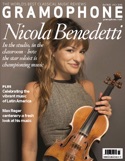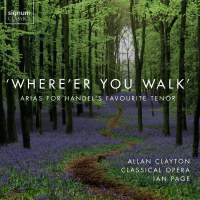Texte paru dans: / Appeared in: |
|
|
Outil de traduction (Très approximatif) |
|
|
Reviewer: Alexandra Coghlan
‘A singer of great excellence. His voice was sound, male, powerful and extensive. His tones were natural and he had flexibility enough to execute any passages, however difficult.’ The paragon performer described here by Charles Dibdin is the tenor John Beard – Handel’s longest-serving singer. It’s into his shoes that Allan Clayton steps in ‘Where’er You Walk’, a collection of arias written for or performed by Beard.
It’s a lovely programme – testimony to the flexibility of Beard’s technique – taking in everything from the delicate, crooned lyricism of ‘Waft her, angels’ from Jephtha and Esther’s ‘Tune your harps’ to the heartier ‘Sol nel mezzo risona del core’ (Il pastor fido) and ‘Call forth thy pow’rs’ from Judas Maccabaeus. The unifying figure of Beard yields more varied repertoire than either Mark Padmore’s ‘As steals the morn…’ (Harmonia Mundi, 5/07) or Christoph Genz’s ‘Un momento di contento’ (Coviello, 2008), with arias from Berenice, Smith’s The Fairies and Arne’s Artaxerxes as well as favourites from Ariodante, Judas Maccabaeus and Semele.
Vocally, though, it’s a closer-run thing. Clayton’s tenor has been getting steadily stronger and more muscular over the past few years, and there’s more evidence of that here. The declamatory recitatives (‘Let but that spirit’) and arias (‘Hark how the hounds and horn’, ‘Call forth thy pow’rs’) ring bright and burnished, thrillingly dramatised. But when it comes to the lyrical, highfloated repertoire Clayton has to work much harder than the lighter Padmore, and for all the sensitivity of phrasing and admirable vocal control he still can’t match the fragile beauty of the latter’s ‘Waft her, angels’. The leaping athleticism of ‘Sol nel mezzo risona del core’ also finds Clayton carefully lyrical rather than comfortably released.
Ultimately it’s a matter of taste:
do you prefer the exquisite studio precision of Padmore or the more lived,
stage-charged interpretations of Clayton? When the latter comes with the added
bonus of a cameo from soprano Mary Bevan (‘As steals the morn’) and the skilled
support of Ian Page and The Orchestra of Classical Opera it’s a very attractive
package. |
|
|
Consultez d'autres mois / Browse other months
|
|
|
|
|
|
Cliquez l'un ou l'autre
bouton pour découvrir bien d'autres critiques de CD |
|




